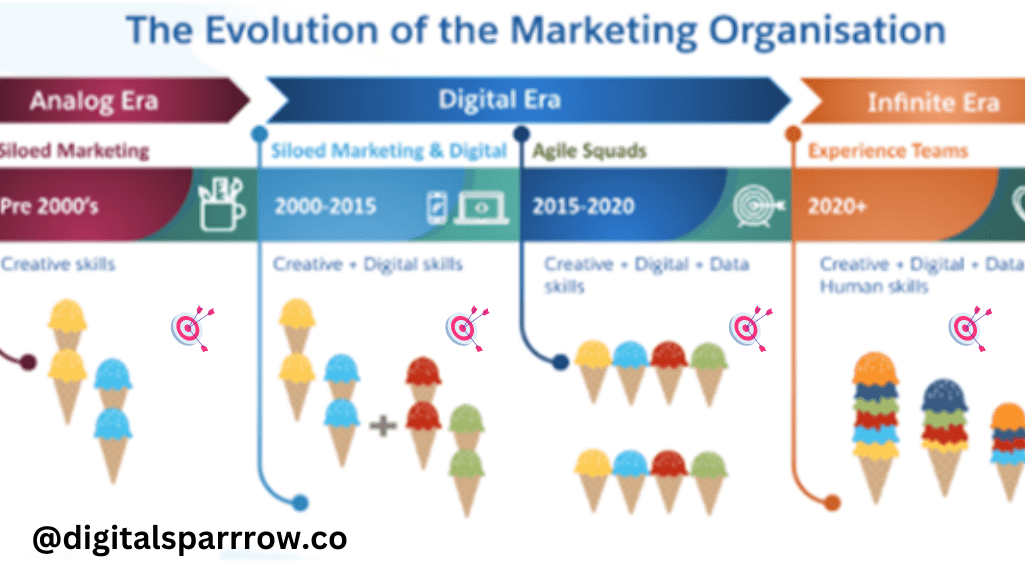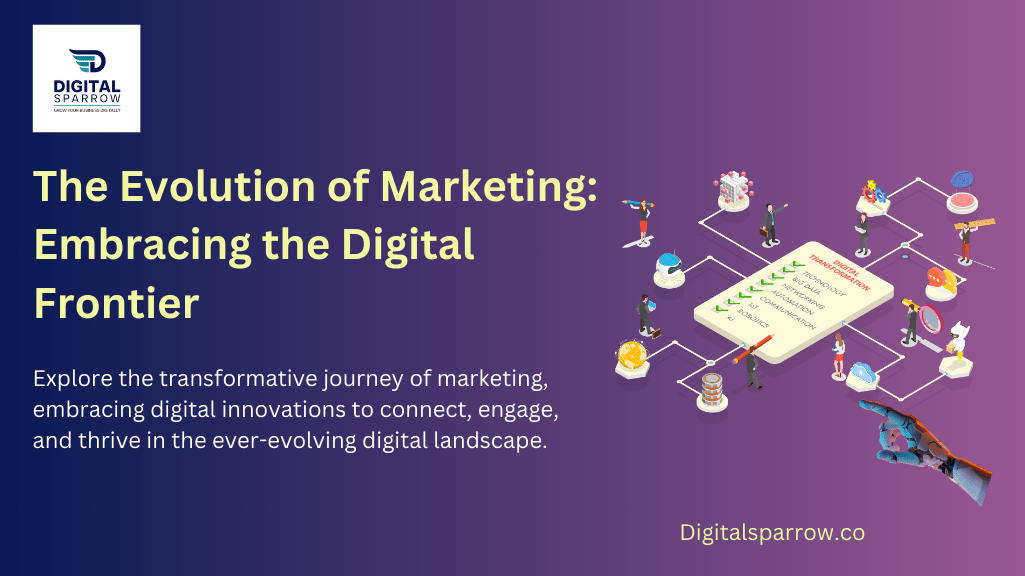The evolution of marketing has been nothing short of a revolution in a world where technology constantly tests the limits. The digital age has altered conventional marketing strategies, and companies must change or risk falling behind. Marketers can now contact and interact with audiences in new ways thanks to the digital frontier, which has created new opportunities. We’ll look at the intriguing history of marketing’s development in this article, along with the reasons why firms must embrace the digital age if they want to succeed in the contemporary marketplace.
From Traditional to Digital: A Paradigm Shift
Prior to recently, traditional media including television, radio, print, and billboards were the main mediums used for marketing. Even if each of these approaches had its own merits, they lacked digital marketing’s precision targeting and quantifiable results. There was a paradigm change in marketing as the internet became more popular. With the rise of social media, email marketing, mobile devices, and search engines, marketers now have access to a variety of new technologies that allow them to communicate with their target market on a personal level.
The Rise of Social Media and Content Marketing
The shift in digital marketing was greatly aided by social media platforms. Brands were able to interact with their customers personally and instantaneously by creating and sharing content, which helped to build brand loyalty. By focusing on giving value through educational and entertaining material, content marketing has become a potent tactic that has replaced overt promotion. Organizations with a competitive edge are those that have mastered the art of storytelling and forged genuine bonds with their audiences.
Personalization and Data-Driven Insights
The ability to collect and analyze a massive amount of data is one of the most important benefits of digital marketing. Personalized experiences can now be provided by marketers who can monitor user behavior, preferences, and demographics. Ads, product recommendations, and email campaigns that are specifically tailored have become commonplace. In addition to improving client satisfaction, this level of personalisation also boosts conversion rates and increases brand loyalty.
Influencer Marketing and User-Generated Content
In the digital era, word-of-mouth marketing has taken on a new form through influencer marketing and user-generated content (UGC). Influencers, or those with large social media followings, have the ability to change consumers’ perceptions of a product or service and raise brand recognition. A brand’s credibility and reach can be increased by collaborating with influencers. UGC also provides real social proof that appeals to potential buyers, such as customer reviews and social media posts.

Artificial Intelligence and Automation
By improving efficiency and targeting accuracy, artificial intelligence (AI) has completely changed marketing. Tools that are driven by AI can analyze data, forecast consumer behavior, and improve marketing campaigns. Automated chatbots offer immediate customer service, enhancing the user experience overall. For improved outcomes, marketers may use AI to make data-driven decisions, allocate resources more wisely, and streamline their operations.
Embracing the Digital Frontier: A Necessity for Businesses
As the digital era progresses, companies must understand that adopting it is now essential to their survival rather than just an option. Competitors who have completely embraced the digital landscape are less likely to be irrelevant and to have a larger portion of the market for those who resist change.
WHY YOU NEED A MARKETING PLAN?
To thrive in the digital era, businesses should consider the following:
Adapt and Innovate: To stay ahead of the curve, adapt and innovate by embracing new technologies and marketing trends. Keep an eye on market trends and be willing to attempt new things.
Know Your Audience: Recognise Your Audience Utilize data analytics to better comprehend your target market. Make sure your marketing communications are relevant to their requirements and tastes.
Content is King: Spend money producing valuable, high-quality content that engages your audience because content is king. Your brand will stand out if you use storytelling and honesty.
Multichannel Approach: Use many digital platforms to efficiently contact your audience by using a multichannel approach. A thorough plan combines paid advertising, SEO, social media, email marketing, and other channels.
Mobile Optimization: Make sure your online presence is mobile-friendly by optimizing it for mobile devices. You cannot afford to ignore the growing number of mobile users who make up a sizable amount of internet traffic.
Data Security and Privacy: Privacy and data security are major concerns when dealing with large amounts of data. To foster trust and loyalty, safeguard the data of your customers and adhere to privacy laws.
Experiment and Measure: Measure your results and continue to experiment with digital marketing. To continuously improve your strategy, test several tactics and gauge their efficacy.
Digital Marketing Blueprint https://digitalsparrow.co/the-digital-marketing-blueprint-building-your-online-presence/
Conclusion
Businesses now have extraordinary access to unprecedented precision and creativity in reaching their target customers because of the advancement of marketing through the digital frontier. Marketing professionals may provide consumers individualized experiences that resonate by combining technology, data, and customer insights. Businesses must embrace the digital revolution if they want to succeed in the constantly shifting business environment of the digital age. This is no longer an option. Businesses can surf the waves of the digital frontier and realize the enormous potential it offers for development and success by adjusting, innovating, and remaining customer-centric.


Pingback: Indexing in SEO: How It Works in Google
Pingback: Right Funding for Your Startup
Your point of view caught my eye and was very interesting. Thanks. I have a question for you.
Thanks for sharing. I read many of your blog posts, cool, your blog is very good.